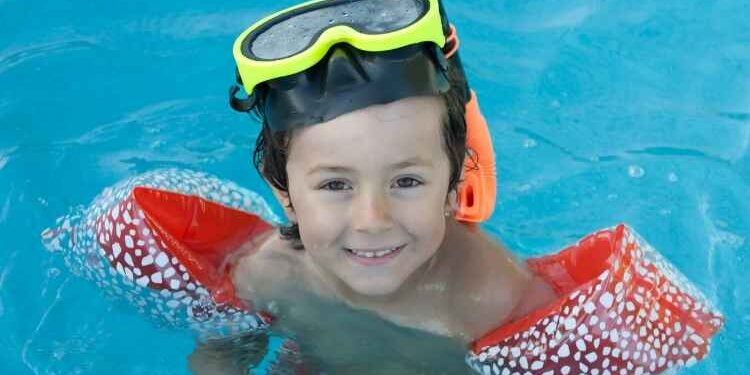Taking the baby swimming is a fun and educational experience, which has many good attributes for the child’s health and well-being. Swimming is a fun activity for both parents and babies, and a good night’s sleep is an added bonus.
What is the best age for a baby to start swimming?
Babies cannot swim when they are born – they have to learn to swim just like they learn to walk. However, most babies enjoy being in the water, and they will be able to swim primitively thanks to their reflexes.
Babies are able to go into the water right from birth. Nonetheless, they can’t regulate their temperature like adults can, so it’s crucial that you keep them from getting too cold. It’s generally best to wait until your baby is around 2 months old before you take them swimming. To keep the baby energized for the new experience, make sure to provide the little one with the very best nutrients.
If your baby is younger than 6 months, ensure the pool is heated to at least 90 degrees Fahrenheit. Public pools are usually too cold for babies under 6 months.
After giving birth, new mothers should not go swimming at least 6 weeks after giving birth.
Benefits
• Swimming develops and grows baby’s muscles – Swimming requires the baby to keep his/her head up, move his/her arms and legs, and take care of his/her body. All of these movements develop the baby’s muscles. Water also improves the mobility of joints, so that the child’s physique becomes stronger also. A baby can also benefit from swimming because it is good for their cardiovascular health and helps them build strength in their hearts, lungs, brains, and blood vessels.
• Swimming develops coordination and balance – In addition to muscle development, swimming also contributes to the baby’s coordination and balance. Small coordinated movements can make a big difference in a child’s development.
• Helps in establishing regular sleep and eating cycle – Your baby will spend a lot of energy swimming. It’s a new environment, he/she is using hieating cycles/her body in different ways plus he/she needs to move a lot to keep warm. All this extra activity consumes a lot of energy and brings good sleep to your baby after training. Exercise stimulates appetite, which means the baby’s appetite is increased along with regular exercise.
• Swimming helps your baby to move independently – Being in the water helps the child to move independently before learning to crawl or walk. It’s a great place for your baby to learn how to balance.
• You can spend quality time with your baby – During a swim lesson, you and your child are focused on each other, so it’s a wonderful way to spend time together.
• Swimming increases the baby’s confidence – When your baby achieves a new skill or accomplishes something that is challenging for him/her, he/she will be more likely to try and learn new things. Swimming also develops self-confidence and provides a sense of security in the aquatic environment, as well as survival skills.
Safety
There are a lot of risks associated with water for babies and young children. Babies can drown in just 5cm of water. Children should never, ever be left unattended near water.
In addition, it is important to be careful with flotation devices, such as rubber rings – they are prone to tipping over and submerging a baby’s head.
Bacteria and viruses can make babies sick if water is not properly treated. Try not to let them swallow any water. Swim nappies should be used, and babies with diarrhea should not go swimming.
When swimming outside, wear clothing that blocks out ultraviolet light to protect your baby from the sun.
Final thoughts
Swim time is perfectly safe if you take all the necessary precautions and give your baby your undivided attention. Swimming is also a wonderful way to bond with your infant. Swimming with our babies brings us into the present moment while teaching them valuable life skills.
So grab your swimsuit and hop into the water!
